HSC210 Health Sociology: Sociological Theories & Health Determinants
VerifiedAdded on 2023/06/14
|10
|2510
|371
Essay
AI Summary
This essay provides a comprehensive analysis of the social determinants of health from sociological perspectives, contrasting them with the biomedical model. It delves into conflict theory, highlighting inequalities in health quality and healthcare delivery based on social class, race, and gender. It also examines symbolic interactionism, focusing on how social constructions of illness and interactions between patients and healthcare professionals impact health outcomes, particularly for marginalized groups like Aboriginals. The essay concludes that social determinants significantly influence health and quality of life, emphasizing the need to consider social and psychological factors alongside biological ones in healthcare.
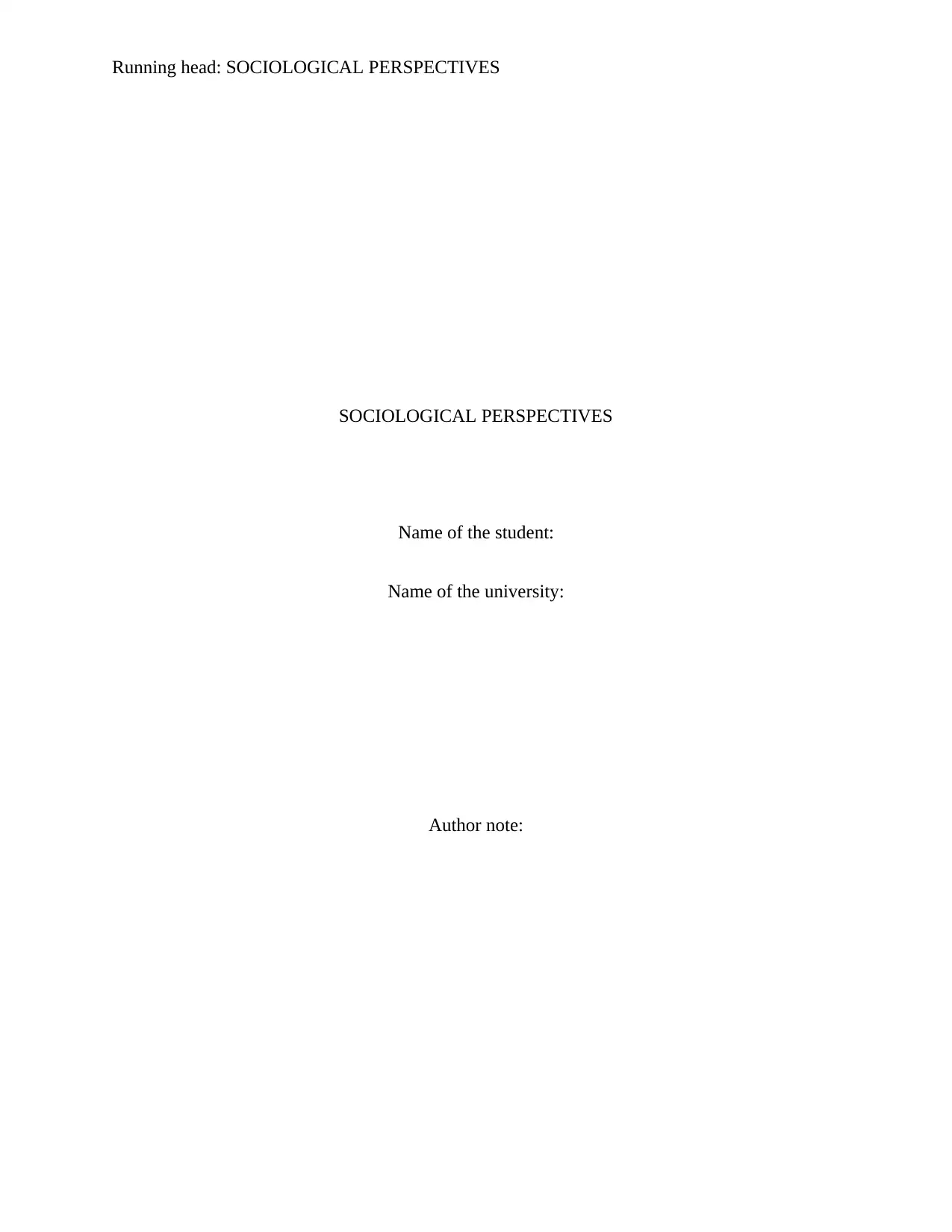
Running head: SOCIOLOGICAL PERSPECTIVES
SOCIOLOGICAL PERSPECTIVES
Name of the student:
Name of the university:
Author note:
SOCIOLOGICAL PERSPECTIVES
Name of the student:
Name of the university:
Author note:
Paraphrase This Document
Need a fresh take? Get an instant paraphrase of this document with our AI Paraphraser

1
SOCIOLOGICAL PERSPECTIVES
Introduction:
Sociology can be described as the scientific study of the society that mainly incorporates
the concern of the patterns of the social relationships, culture as well as social interaction.
Researchers have described it as the social science that is mainly seen to involve different types
of methods like that of the empirical investigation as well as critical analysis in order to gain
knowledge on the topics of social order, acceptance an even include changes or social evolution
(Eikemo et al., 2017). Over the years, sociological factors are also seen to affect health of human
beings in various ways and a growing number of evidence tends portray an association of
sociology with that of health. This assignment will mainly portray different sociological
perspectives in describing the social determinants of health and accordingly shed more light on
the topics.
Sociology and the Role of Perspectives:
Sociology can be defined as the subject that deals with the human social relationships as
well as other institutions. The subject matter is quite diverse and it may range from family to that
of state, crime to that of religion, from the divisions of the social classes and the races to that of
the shared beliefs of the common culture. It also includes important factors ranging from social
stabilities to that of radical changes in the whole societies. It helps in emphasizing the careful
gathering as well as the analysis of the evidences about the social lives (Castarieda et al., 2015).
This helps in development as well as enrichment of an individual’s understanding of the key
social procedures.
The different approaches that individuals adopt for understanding the different aspects of
the society are called the perspectives. The sociology in the field of health and illness mainly
SOCIOLOGICAL PERSPECTIVES
Introduction:
Sociology can be described as the scientific study of the society that mainly incorporates
the concern of the patterns of the social relationships, culture as well as social interaction.
Researchers have described it as the social science that is mainly seen to involve different types
of methods like that of the empirical investigation as well as critical analysis in order to gain
knowledge on the topics of social order, acceptance an even include changes or social evolution
(Eikemo et al., 2017). Over the years, sociological factors are also seen to affect health of human
beings in various ways and a growing number of evidence tends portray an association of
sociology with that of health. This assignment will mainly portray different sociological
perspectives in describing the social determinants of health and accordingly shed more light on
the topics.
Sociology and the Role of Perspectives:
Sociology can be defined as the subject that deals with the human social relationships as
well as other institutions. The subject matter is quite diverse and it may range from family to that
of state, crime to that of religion, from the divisions of the social classes and the races to that of
the shared beliefs of the common culture. It also includes important factors ranging from social
stabilities to that of radical changes in the whole societies. It helps in emphasizing the careful
gathering as well as the analysis of the evidences about the social lives (Castarieda et al., 2015).
This helps in development as well as enrichment of an individual’s understanding of the key
social procedures.
The different approaches that individuals adopt for understanding the different aspects of
the society are called the perspectives. The sociology in the field of health and illness mainly
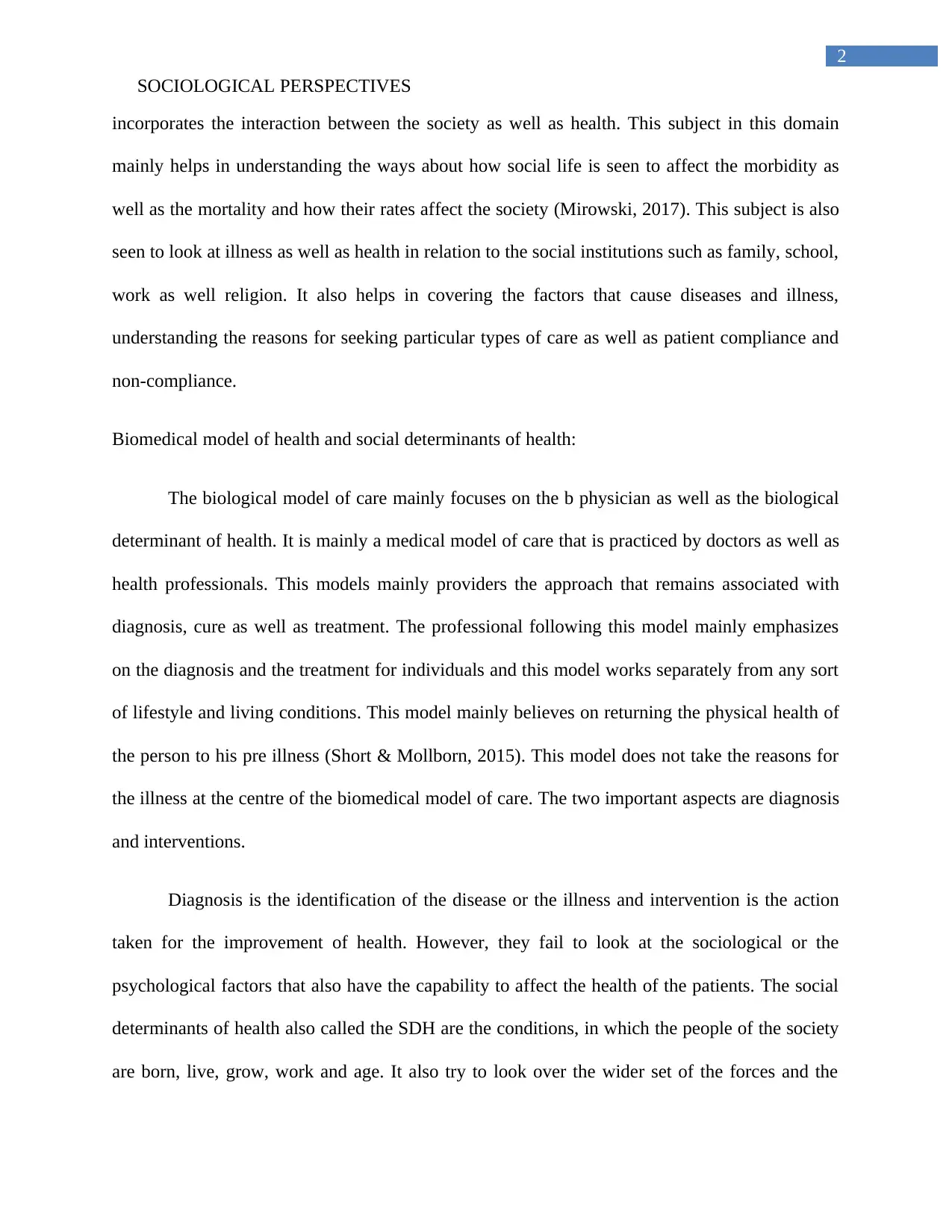
2
SOCIOLOGICAL PERSPECTIVES
incorporates the interaction between the society as well as health. This subject in this domain
mainly helps in understanding the ways about how social life is seen to affect the morbidity as
well as the mortality and how their rates affect the society (Mirowski, 2017). This subject is also
seen to look at illness as well as health in relation to the social institutions such as family, school,
work as well religion. It also helps in covering the factors that cause diseases and illness,
understanding the reasons for seeking particular types of care as well as patient compliance and
non-compliance.
Biomedical model of health and social determinants of health:
The biological model of care mainly focuses on the b physician as well as the biological
determinant of health. It is mainly a medical model of care that is practiced by doctors as well as
health professionals. This models mainly providers the approach that remains associated with
diagnosis, cure as well as treatment. The professional following this model mainly emphasizes
on the diagnosis and the treatment for individuals and this model works separately from any sort
of lifestyle and living conditions. This model mainly believes on returning the physical health of
the person to his pre illness (Short & Mollborn, 2015). This model does not take the reasons for
the illness at the centre of the biomedical model of care. The two important aspects are diagnosis
and interventions.
Diagnosis is the identification of the disease or the illness and intervention is the action
taken for the improvement of health. However, they fail to look at the sociological or the
psychological factors that also have the capability to affect the health of the patients. The social
determinants of health also called the SDH are the conditions, in which the people of the society
are born, live, grow, work and age. It also try to look over the wider set of the forces and the
SOCIOLOGICAL PERSPECTIVES
incorporates the interaction between the society as well as health. This subject in this domain
mainly helps in understanding the ways about how social life is seen to affect the morbidity as
well as the mortality and how their rates affect the society (Mirowski, 2017). This subject is also
seen to look at illness as well as health in relation to the social institutions such as family, school,
work as well religion. It also helps in covering the factors that cause diseases and illness,
understanding the reasons for seeking particular types of care as well as patient compliance and
non-compliance.
Biomedical model of health and social determinants of health:
The biological model of care mainly focuses on the b physician as well as the biological
determinant of health. It is mainly a medical model of care that is practiced by doctors as well as
health professionals. This models mainly providers the approach that remains associated with
diagnosis, cure as well as treatment. The professional following this model mainly emphasizes
on the diagnosis and the treatment for individuals and this model works separately from any sort
of lifestyle and living conditions. This model mainly believes on returning the physical health of
the person to his pre illness (Short & Mollborn, 2015). This model does not take the reasons for
the illness at the centre of the biomedical model of care. The two important aspects are diagnosis
and interventions.
Diagnosis is the identification of the disease or the illness and intervention is the action
taken for the improvement of health. However, they fail to look at the sociological or the
psychological factors that also have the capability to affect the health of the patients. The social
determinants of health also called the SDH are the conditions, in which the people of the society
are born, live, grow, work and age. It also try to look over the wider set of the forces and the
⊘ This is a preview!⊘
Do you want full access?
Subscribe today to unlock all pages.

Trusted by 1+ million students worldwide
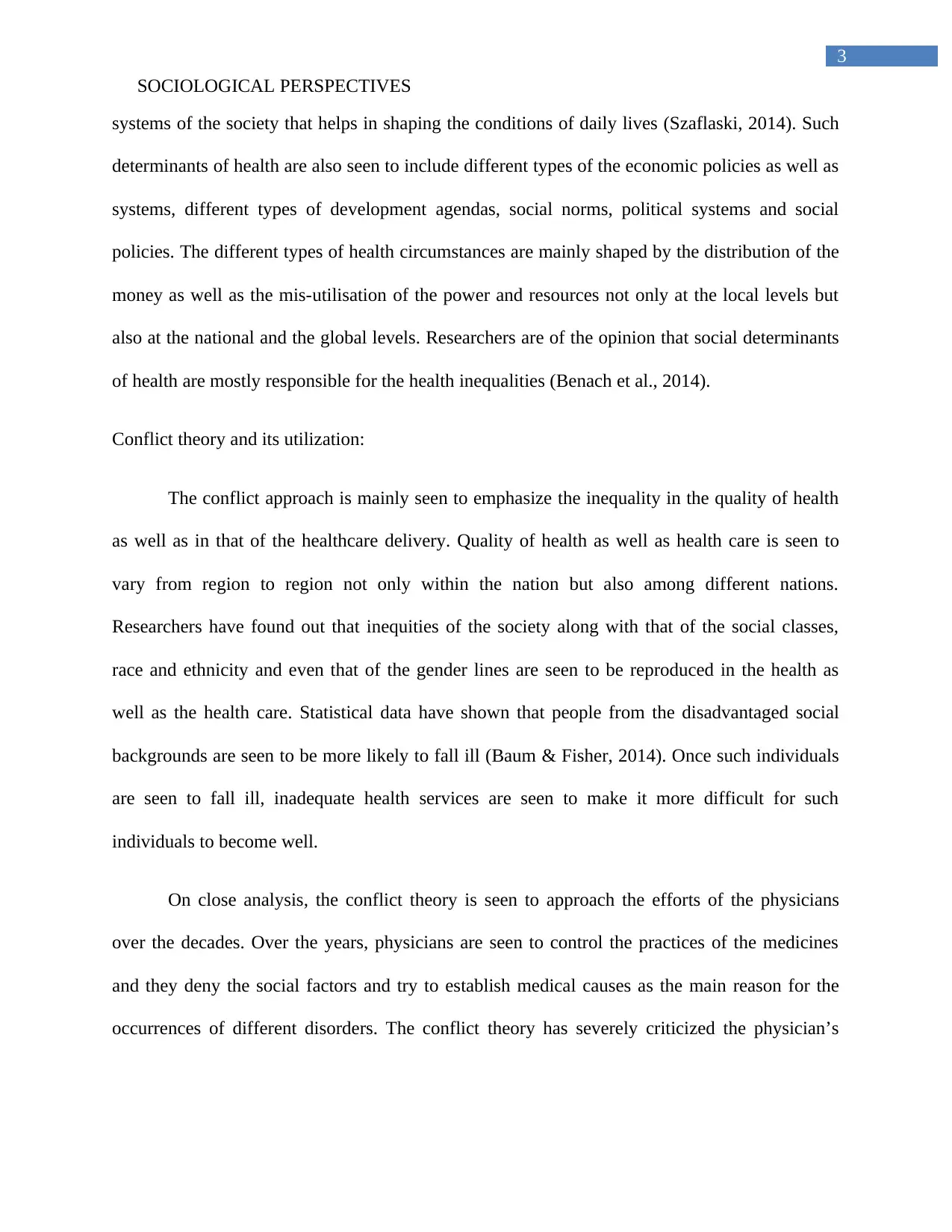
3
SOCIOLOGICAL PERSPECTIVES
systems of the society that helps in shaping the conditions of daily lives (Szaflaski, 2014). Such
determinants of health are also seen to include different types of the economic policies as well as
systems, different types of development agendas, social norms, political systems and social
policies. The different types of health circumstances are mainly shaped by the distribution of the
money as well as the mis-utilisation of the power and resources not only at the local levels but
also at the national and the global levels. Researchers are of the opinion that social determinants
of health are mostly responsible for the health inequalities (Benach et al., 2014).
Conflict theory and its utilization:
The conflict approach is mainly seen to emphasize the inequality in the quality of health
as well as in that of the healthcare delivery. Quality of health as well as health care is seen to
vary from region to region not only within the nation but also among different nations.
Researchers have found out that inequities of the society along with that of the social classes,
race and ethnicity and even that of the gender lines are seen to be reproduced in the health as
well as the health care. Statistical data have shown that people from the disadvantaged social
backgrounds are seen to be more likely to fall ill (Baum & Fisher, 2014). Once such individuals
are seen to fall ill, inadequate health services are seen to make it more difficult for such
individuals to become well.
On close analysis, the conflict theory is seen to approach the efforts of the physicians
over the decades. Over the years, physicians are seen to control the practices of the medicines
and they deny the social factors and try to establish medical causes as the main reason for the
occurrences of different disorders. The conflict theory has severely criticized the physician’s
SOCIOLOGICAL PERSPECTIVES
systems of the society that helps in shaping the conditions of daily lives (Szaflaski, 2014). Such
determinants of health are also seen to include different types of the economic policies as well as
systems, different types of development agendas, social norms, political systems and social
policies. The different types of health circumstances are mainly shaped by the distribution of the
money as well as the mis-utilisation of the power and resources not only at the local levels but
also at the national and the global levels. Researchers are of the opinion that social determinants
of health are mostly responsible for the health inequalities (Benach et al., 2014).
Conflict theory and its utilization:
The conflict approach is mainly seen to emphasize the inequality in the quality of health
as well as in that of the healthcare delivery. Quality of health as well as health care is seen to
vary from region to region not only within the nation but also among different nations.
Researchers have found out that inequities of the society along with that of the social classes,
race and ethnicity and even that of the gender lines are seen to be reproduced in the health as
well as the health care. Statistical data have shown that people from the disadvantaged social
backgrounds are seen to be more likely to fall ill (Baum & Fisher, 2014). Once such individuals
are seen to fall ill, inadequate health services are seen to make it more difficult for such
individuals to become well.
On close analysis, the conflict theory is seen to approach the efforts of the physicians
over the decades. Over the years, physicians are seen to control the practices of the medicines
and they deny the social factors and try to establish medical causes as the main reason for the
occurrences of different disorders. The conflict theory has severely criticized the physician’s
Paraphrase This Document
Need a fresh take? Get an instant paraphrase of this document with our AI Paraphraser
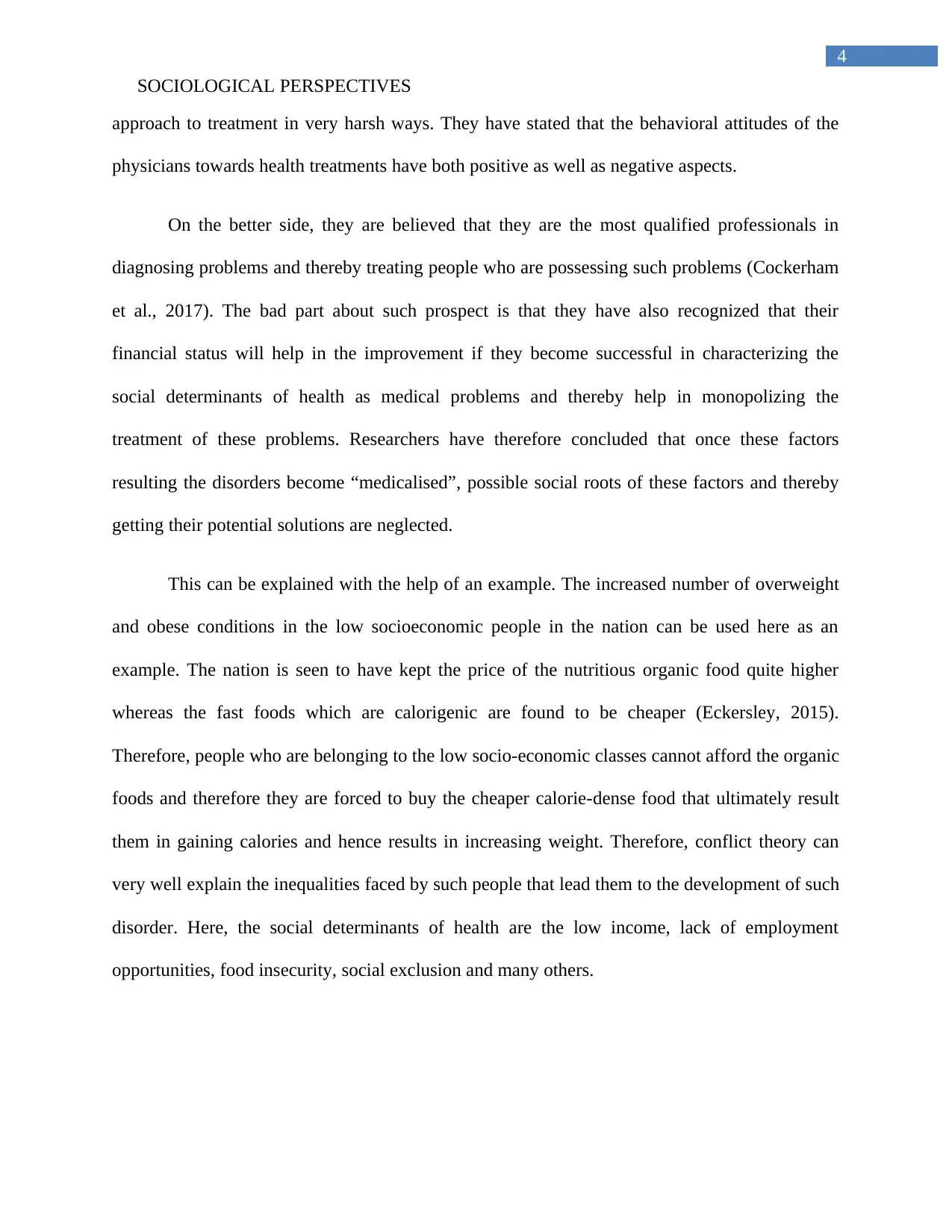
4
SOCIOLOGICAL PERSPECTIVES
approach to treatment in very harsh ways. They have stated that the behavioral attitudes of the
physicians towards health treatments have both positive as well as negative aspects.
On the better side, they are believed that they are the most qualified professionals in
diagnosing problems and thereby treating people who are possessing such problems (Cockerham
et al., 2017). The bad part about such prospect is that they have also recognized that their
financial status will help in the improvement if they become successful in characterizing the
social determinants of health as medical problems and thereby help in monopolizing the
treatment of these problems. Researchers have therefore concluded that once these factors
resulting the disorders become “medicalised”, possible social roots of these factors and thereby
getting their potential solutions are neglected.
This can be explained with the help of an example. The increased number of overweight
and obese conditions in the low socioeconomic people in the nation can be used here as an
example. The nation is seen to have kept the price of the nutritious organic food quite higher
whereas the fast foods which are calorigenic are found to be cheaper (Eckersley, 2015).
Therefore, people who are belonging to the low socio-economic classes cannot afford the organic
foods and therefore they are forced to buy the cheaper calorie-dense food that ultimately result
them in gaining calories and hence results in increasing weight. Therefore, conflict theory can
very well explain the inequalities faced by such people that lead them to the development of such
disorder. Here, the social determinants of health are the low income, lack of employment
opportunities, food insecurity, social exclusion and many others.
SOCIOLOGICAL PERSPECTIVES
approach to treatment in very harsh ways. They have stated that the behavioral attitudes of the
physicians towards health treatments have both positive as well as negative aspects.
On the better side, they are believed that they are the most qualified professionals in
diagnosing problems and thereby treating people who are possessing such problems (Cockerham
et al., 2017). The bad part about such prospect is that they have also recognized that their
financial status will help in the improvement if they become successful in characterizing the
social determinants of health as medical problems and thereby help in monopolizing the
treatment of these problems. Researchers have therefore concluded that once these factors
resulting the disorders become “medicalised”, possible social roots of these factors and thereby
getting their potential solutions are neglected.
This can be explained with the help of an example. The increased number of overweight
and obese conditions in the low socioeconomic people in the nation can be used here as an
example. The nation is seen to have kept the price of the nutritious organic food quite higher
whereas the fast foods which are calorigenic are found to be cheaper (Eckersley, 2015).
Therefore, people who are belonging to the low socio-economic classes cannot afford the organic
foods and therefore they are forced to buy the cheaper calorie-dense food that ultimately result
them in gaining calories and hence results in increasing weight. Therefore, conflict theory can
very well explain the inequalities faced by such people that lead them to the development of such
disorder. Here, the social determinants of health are the low income, lack of employment
opportunities, food insecurity, social exclusion and many others.
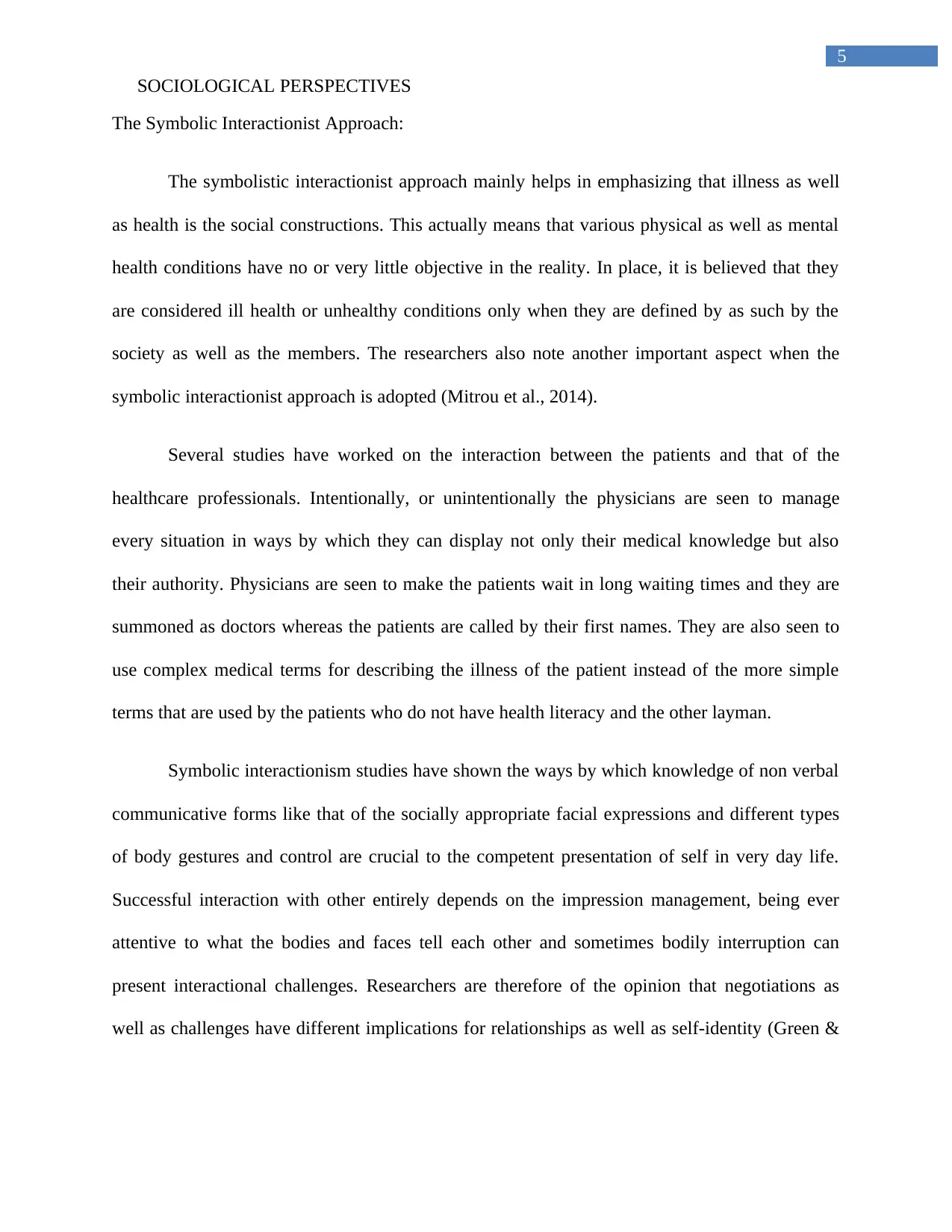
5
SOCIOLOGICAL PERSPECTIVES
The Symbolic Interactionist Approach:
The symbolistic interactionist approach mainly helps in emphasizing that illness as well
as health is the social constructions. This actually means that various physical as well as mental
health conditions have no or very little objective in the reality. In place, it is believed that they
are considered ill health or unhealthy conditions only when they are defined by as such by the
society as well as the members. The researchers also note another important aspect when the
symbolic interactionist approach is adopted (Mitrou et al., 2014).
Several studies have worked on the interaction between the patients and that of the
healthcare professionals. Intentionally, or unintentionally the physicians are seen to manage
every situation in ways by which they can display not only their medical knowledge but also
their authority. Physicians are seen to make the patients wait in long waiting times and they are
summoned as doctors whereas the patients are called by their first names. They are also seen to
use complex medical terms for describing the illness of the patient instead of the more simple
terms that are used by the patients who do not have health literacy and the other layman.
Symbolic interactionism studies have shown the ways by which knowledge of non verbal
communicative forms like that of the socially appropriate facial expressions and different types
of body gestures and control are crucial to the competent presentation of self in very day life.
Successful interaction with other entirely depends on the impression management, being ever
attentive to what the bodies and faces tell each other and sometimes bodily interruption can
present interactional challenges. Researchers are therefore of the opinion that negotiations as
well as challenges have different implications for relationships as well as self-identity (Green &
SOCIOLOGICAL PERSPECTIVES
The Symbolic Interactionist Approach:
The symbolistic interactionist approach mainly helps in emphasizing that illness as well
as health is the social constructions. This actually means that various physical as well as mental
health conditions have no or very little objective in the reality. In place, it is believed that they
are considered ill health or unhealthy conditions only when they are defined by as such by the
society as well as the members. The researchers also note another important aspect when the
symbolic interactionist approach is adopted (Mitrou et al., 2014).
Several studies have worked on the interaction between the patients and that of the
healthcare professionals. Intentionally, or unintentionally the physicians are seen to manage
every situation in ways by which they can display not only their medical knowledge but also
their authority. Physicians are seen to make the patients wait in long waiting times and they are
summoned as doctors whereas the patients are called by their first names. They are also seen to
use complex medical terms for describing the illness of the patient instead of the more simple
terms that are used by the patients who do not have health literacy and the other layman.
Symbolic interactionism studies have shown the ways by which knowledge of non verbal
communicative forms like that of the socially appropriate facial expressions and different types
of body gestures and control are crucial to the competent presentation of self in very day life.
Successful interaction with other entirely depends on the impression management, being ever
attentive to what the bodies and faces tell each other and sometimes bodily interruption can
present interactional challenges. Researchers are therefore of the opinion that negotiations as
well as challenges have different implications for relationships as well as self-identity (Green &
⊘ This is a preview!⊘
Do you want full access?
Subscribe today to unlock all pages.

Trusted by 1+ million students worldwide
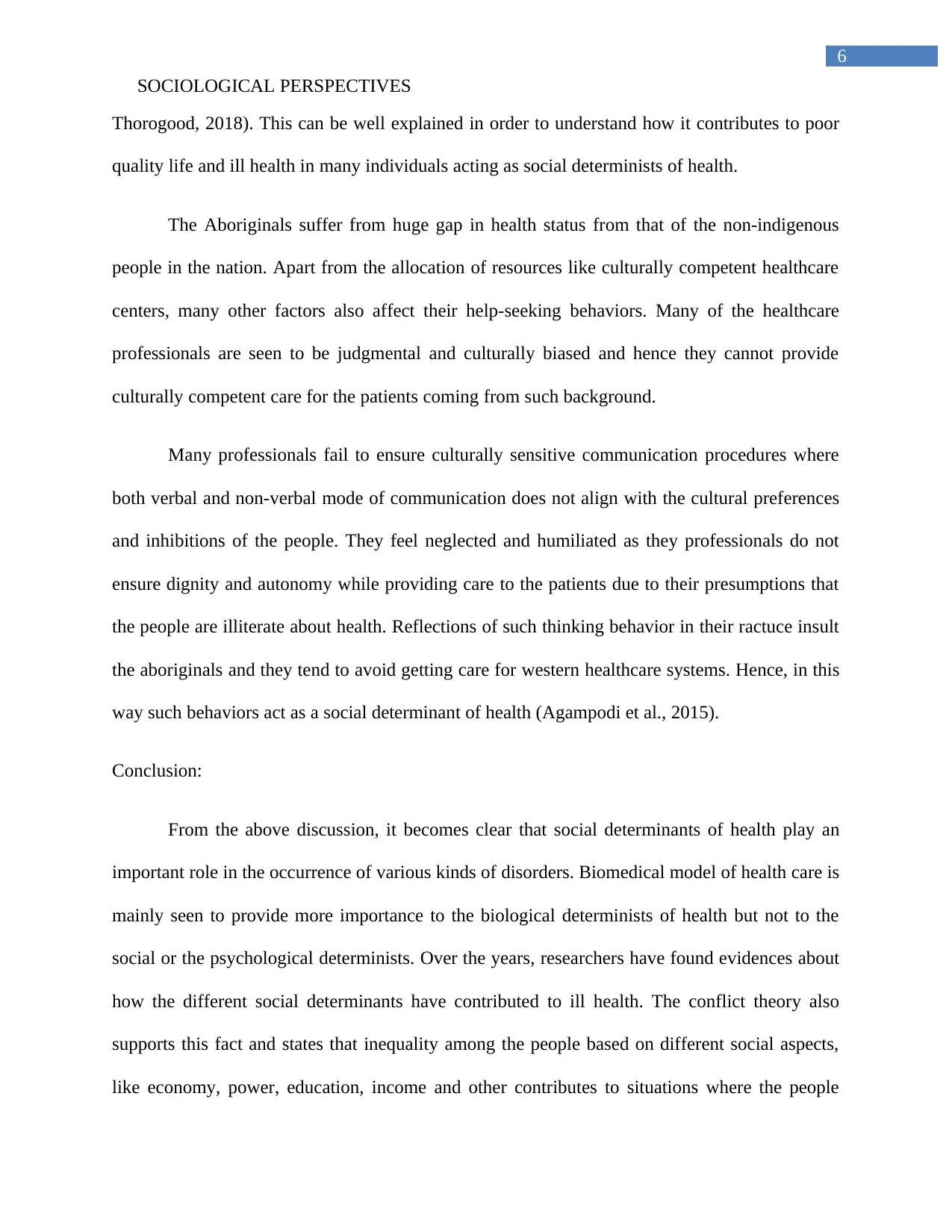
6
SOCIOLOGICAL PERSPECTIVES
Thorogood, 2018). This can be well explained in order to understand how it contributes to poor
quality life and ill health in many individuals acting as social determinists of health.
The Aboriginals suffer from huge gap in health status from that of the non-indigenous
people in the nation. Apart from the allocation of resources like culturally competent healthcare
centers, many other factors also affect their help-seeking behaviors. Many of the healthcare
professionals are seen to be judgmental and culturally biased and hence they cannot provide
culturally competent care for the patients coming from such background.
Many professionals fail to ensure culturally sensitive communication procedures where
both verbal and non-verbal mode of communication does not align with the cultural preferences
and inhibitions of the people. They feel neglected and humiliated as they professionals do not
ensure dignity and autonomy while providing care to the patients due to their presumptions that
the people are illiterate about health. Reflections of such thinking behavior in their ractuce insult
the aboriginals and they tend to avoid getting care for western healthcare systems. Hence, in this
way such behaviors act as a social determinant of health (Agampodi et al., 2015).
Conclusion:
From the above discussion, it becomes clear that social determinants of health play an
important role in the occurrence of various kinds of disorders. Biomedical model of health care is
mainly seen to provide more importance to the biological determinists of health but not to the
social or the psychological determinists. Over the years, researchers have found evidences about
how the different social determinants have contributed to ill health. The conflict theory also
supports this fact and states that inequality among the people based on different social aspects,
like economy, power, education, income and other contributes to situations where the people
SOCIOLOGICAL PERSPECTIVES
Thorogood, 2018). This can be well explained in order to understand how it contributes to poor
quality life and ill health in many individuals acting as social determinists of health.
The Aboriginals suffer from huge gap in health status from that of the non-indigenous
people in the nation. Apart from the allocation of resources like culturally competent healthcare
centers, many other factors also affect their help-seeking behaviors. Many of the healthcare
professionals are seen to be judgmental and culturally biased and hence they cannot provide
culturally competent care for the patients coming from such background.
Many professionals fail to ensure culturally sensitive communication procedures where
both verbal and non-verbal mode of communication does not align with the cultural preferences
and inhibitions of the people. They feel neglected and humiliated as they professionals do not
ensure dignity and autonomy while providing care to the patients due to their presumptions that
the people are illiterate about health. Reflections of such thinking behavior in their ractuce insult
the aboriginals and they tend to avoid getting care for western healthcare systems. Hence, in this
way such behaviors act as a social determinant of health (Agampodi et al., 2015).
Conclusion:
From the above discussion, it becomes clear that social determinants of health play an
important role in the occurrence of various kinds of disorders. Biomedical model of health care is
mainly seen to provide more importance to the biological determinists of health but not to the
social or the psychological determinists. Over the years, researchers have found evidences about
how the different social determinants have contributed to ill health. The conflict theory also
supports this fact and states that inequality among the people based on different social aspects,
like economy, power, education, income and other contributes to situations where the people
Paraphrase This Document
Need a fresh take? Get an instant paraphrase of this document with our AI Paraphraser
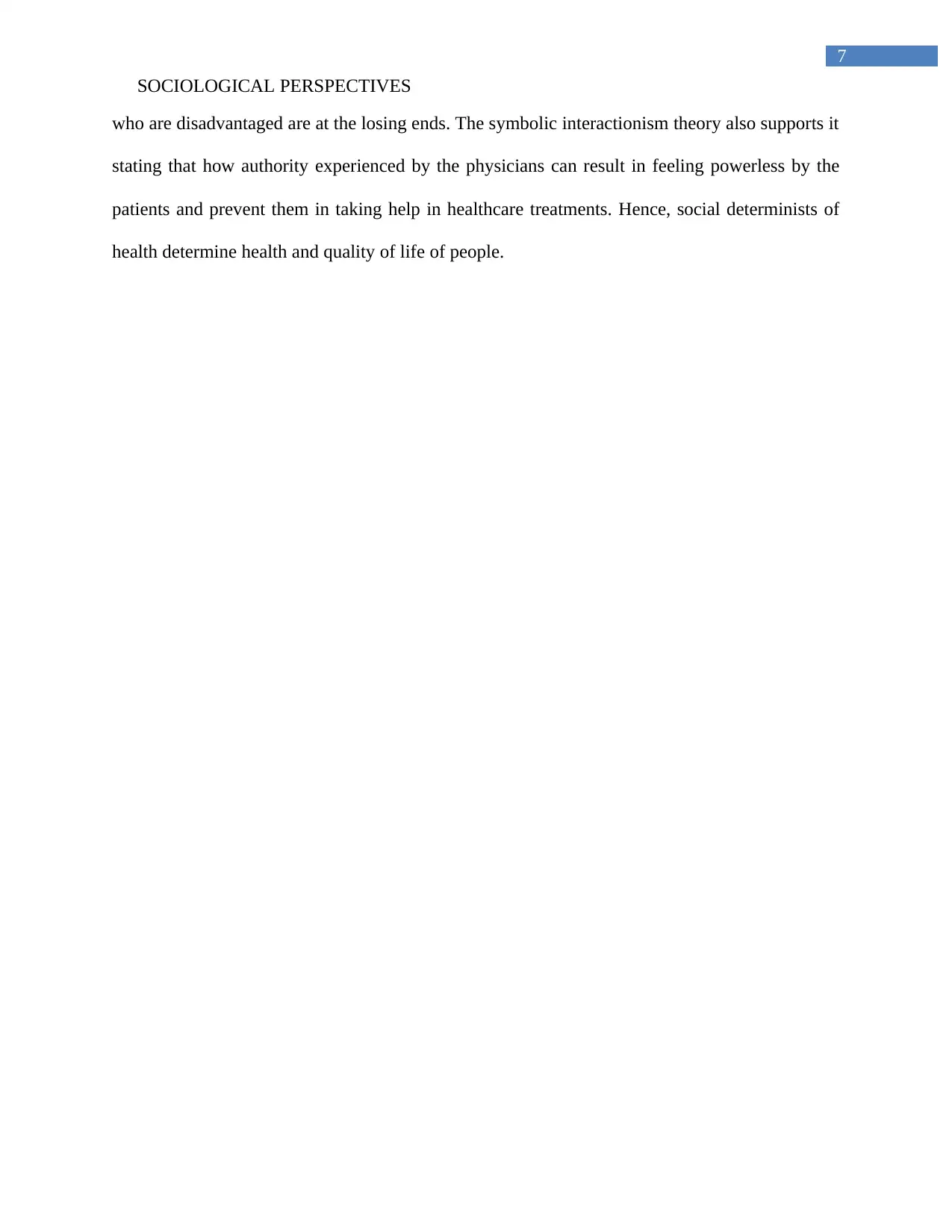
7
SOCIOLOGICAL PERSPECTIVES
who are disadvantaged are at the losing ends. The symbolic interactionism theory also supports it
stating that how authority experienced by the physicians can result in feeling powerless by the
patients and prevent them in taking help in healthcare treatments. Hence, social determinists of
health determine health and quality of life of people.
SOCIOLOGICAL PERSPECTIVES
who are disadvantaged are at the losing ends. The symbolic interactionism theory also supports it
stating that how authority experienced by the physicians can result in feeling powerless by the
patients and prevent them in taking help in healthcare treatments. Hence, social determinists of
health determine health and quality of life of people.
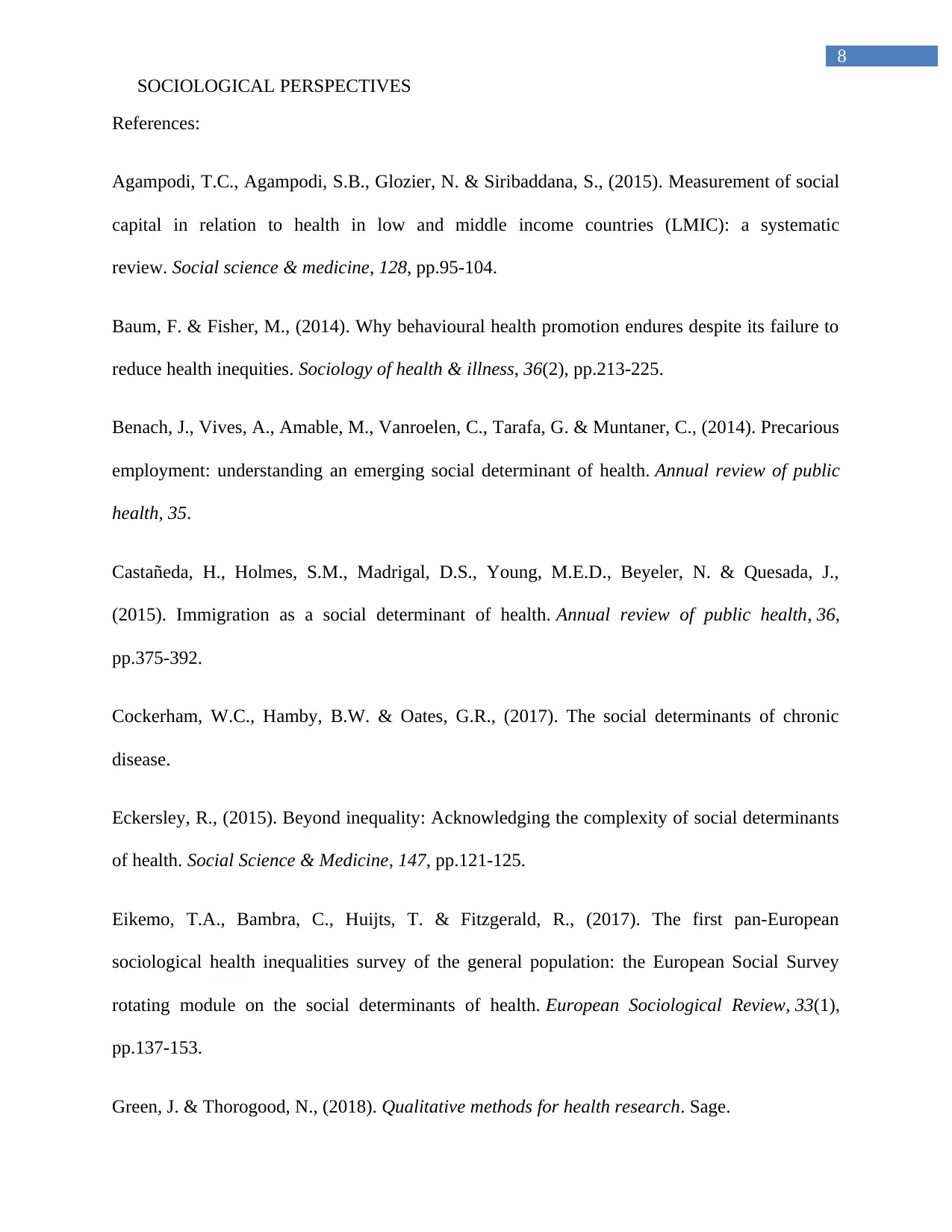
8
SOCIOLOGICAL PERSPECTIVES
References:
Agampodi, T.C., Agampodi, S.B., Glozier, N. & Siribaddana, S., (2015). Measurement of social
capital in relation to health in low and middle income countries (LMIC): a systematic
review. Social science & medicine, 128, pp.95-104.
Baum, F. & Fisher, M., (2014). Why behavioural health promotion endures despite its failure to
reduce health inequities. Sociology of health & illness, 36(2), pp.213-225.
Benach, J., Vives, A., Amable, M., Vanroelen, C., Tarafa, G. & Muntaner, C., (2014). Precarious
employment: understanding an emerging social determinant of health. Annual review of public
health, 35.
Castañeda, H., Holmes, S.M., Madrigal, D.S., Young, M.E.D., Beyeler, N. & Quesada, J.,
(2015). Immigration as a social determinant of health. Annual review of public health, 36,
pp.375-392.
Cockerham, W.C., Hamby, B.W. & Oates, G.R., (2017). The social determinants of chronic
disease.
Eckersley, R., (2015). Beyond inequality: Acknowledging the complexity of social determinants
of health. Social Science & Medicine, 147, pp.121-125.
Eikemo, T.A., Bambra, C., Huijts, T. & Fitzgerald, R., (2017). The first pan-European
sociological health inequalities survey of the general population: the European Social Survey
rotating module on the social determinants of health. European Sociological Review, 33(1),
pp.137-153.
Green, J. & Thorogood, N., (2018). Qualitative methods for health research. Sage.
SOCIOLOGICAL PERSPECTIVES
References:
Agampodi, T.C., Agampodi, S.B., Glozier, N. & Siribaddana, S., (2015). Measurement of social
capital in relation to health in low and middle income countries (LMIC): a systematic
review. Social science & medicine, 128, pp.95-104.
Baum, F. & Fisher, M., (2014). Why behavioural health promotion endures despite its failure to
reduce health inequities. Sociology of health & illness, 36(2), pp.213-225.
Benach, J., Vives, A., Amable, M., Vanroelen, C., Tarafa, G. & Muntaner, C., (2014). Precarious
employment: understanding an emerging social determinant of health. Annual review of public
health, 35.
Castañeda, H., Holmes, S.M., Madrigal, D.S., Young, M.E.D., Beyeler, N. & Quesada, J.,
(2015). Immigration as a social determinant of health. Annual review of public health, 36,
pp.375-392.
Cockerham, W.C., Hamby, B.W. & Oates, G.R., (2017). The social determinants of chronic
disease.
Eckersley, R., (2015). Beyond inequality: Acknowledging the complexity of social determinants
of health. Social Science & Medicine, 147, pp.121-125.
Eikemo, T.A., Bambra, C., Huijts, T. & Fitzgerald, R., (2017). The first pan-European
sociological health inequalities survey of the general population: the European Social Survey
rotating module on the social determinants of health. European Sociological Review, 33(1),
pp.137-153.
Green, J. & Thorogood, N., (2018). Qualitative methods for health research. Sage.
⊘ This is a preview!⊘
Do you want full access?
Subscribe today to unlock all pages.

Trusted by 1+ million students worldwide
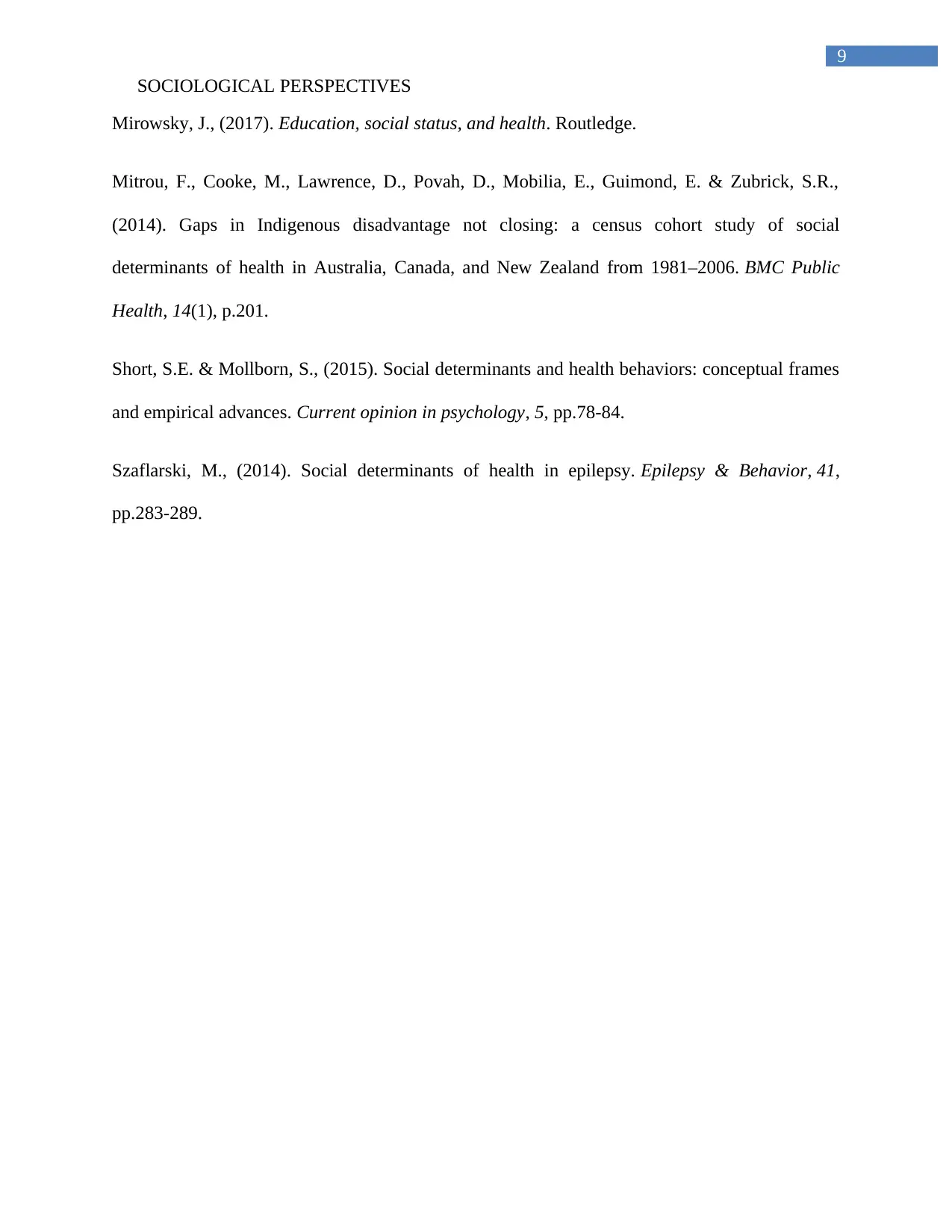
9
SOCIOLOGICAL PERSPECTIVES
Mirowsky, J., (2017). Education, social status, and health. Routledge.
Mitrou, F., Cooke, M., Lawrence, D., Povah, D., Mobilia, E., Guimond, E. & Zubrick, S.R.,
(2014). Gaps in Indigenous disadvantage not closing: a census cohort study of social
determinants of health in Australia, Canada, and New Zealand from 1981–2006. BMC Public
Health, 14(1), p.201.
Short, S.E. & Mollborn, S., (2015). Social determinants and health behaviors: conceptual frames
and empirical advances. Current opinion in psychology, 5, pp.78-84.
Szaflarski, M., (2014). Social determinants of health in epilepsy. Epilepsy & Behavior, 41,
pp.283-289.
SOCIOLOGICAL PERSPECTIVES
Mirowsky, J., (2017). Education, social status, and health. Routledge.
Mitrou, F., Cooke, M., Lawrence, D., Povah, D., Mobilia, E., Guimond, E. & Zubrick, S.R.,
(2014). Gaps in Indigenous disadvantage not closing: a census cohort study of social
determinants of health in Australia, Canada, and New Zealand from 1981–2006. BMC Public
Health, 14(1), p.201.
Short, S.E. & Mollborn, S., (2015). Social determinants and health behaviors: conceptual frames
and empirical advances. Current opinion in psychology, 5, pp.78-84.
Szaflarski, M., (2014). Social determinants of health in epilepsy. Epilepsy & Behavior, 41,
pp.283-289.
1 out of 10
Related Documents
Your All-in-One AI-Powered Toolkit for Academic Success.
+13062052269
info@desklib.com
Available 24*7 on WhatsApp / Email
![[object Object]](/_next/static/media/star-bottom.7253800d.svg)
Unlock your academic potential
Copyright © 2020–2026 A2Z Services. All Rights Reserved. Developed and managed by ZUCOL.





